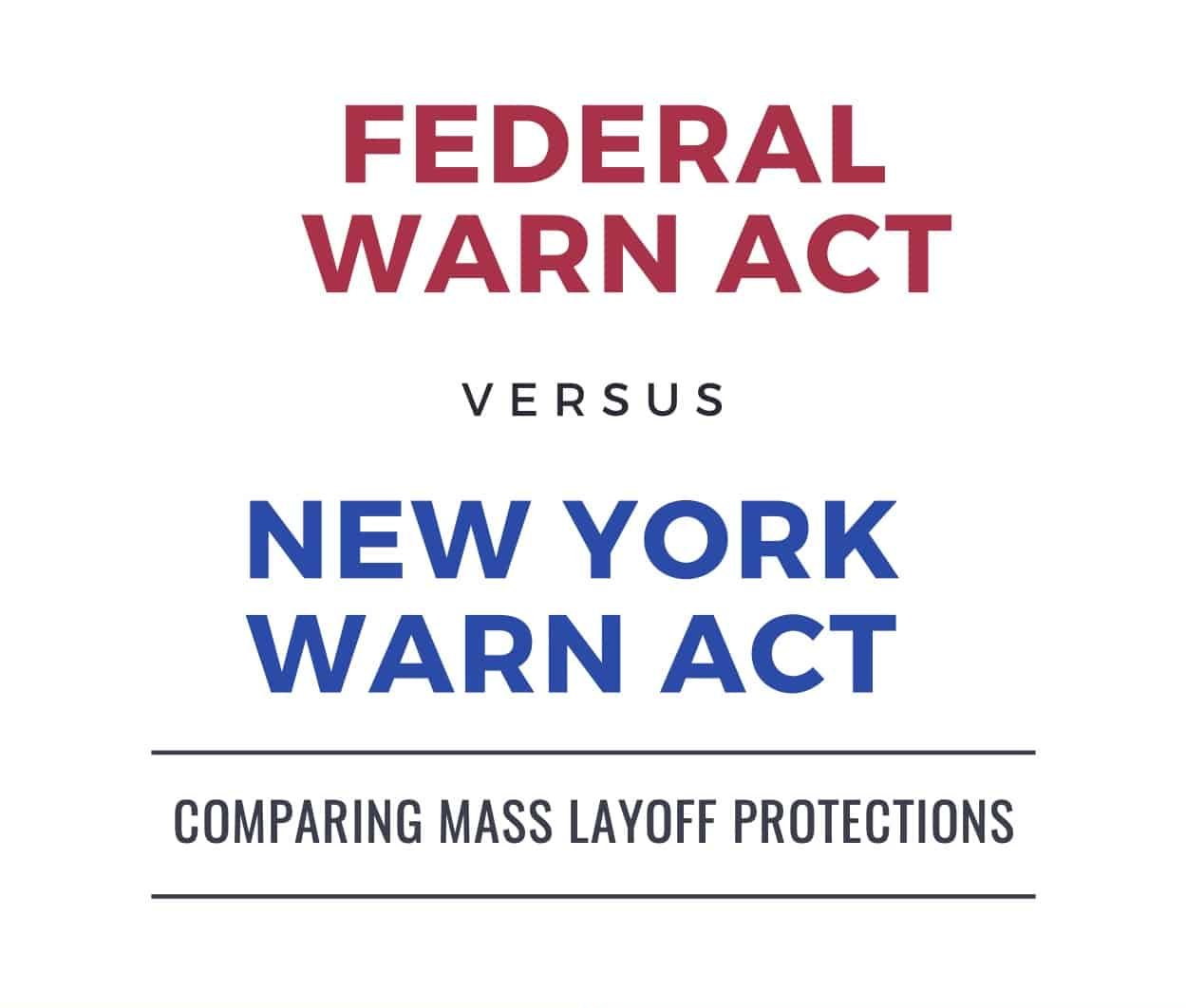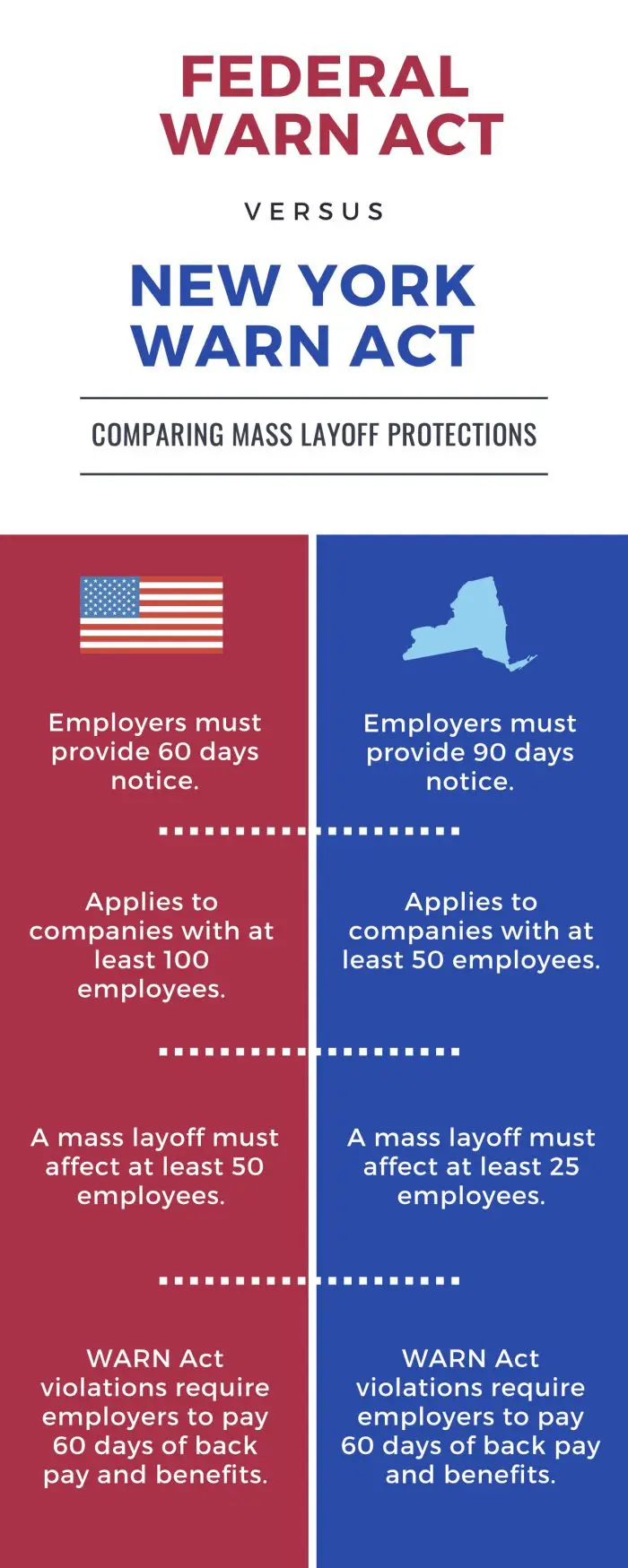Mass Layoffs and the WARN Act in New York
Mass layoffs harm workers and communities.
The NY WARN Act protects workers.

In New York, the WARN Act protects workers by requiring notice before a mass layoff. Employers must provide a NY WARN notice to their employees or pay penalties. These include back pay and benefits for 60 days.
If you’ve been affected by a mass layoff or plant closure, the WARN Act NY can guarantee you 60 days of pay and benefits.
An employment lawyer can file a class-action lawsuit against your employer for NY WARN Act violations.
The Federal WARN Act
The WARN Act protects workers when companies announce mass layoffs. Under federal law, employers must provide at least 60 days’ notice before a mass layoff.
The act applies to companies with at least 100 employees when they lay off at least 50 employees.
Congress passed the Worker Adjustment and Retraining Notification (WARN) Act in 1988. Under the act, companies must give employees notice so they can prepare for the job market or pursue additional training.
If companies do not meet WARN requirements, they must pay penalties to their employees. These include back pay and benefits for the 60 days prior to a layoff.
Learn more about the Federal WARN Act and WARN acts by state.
The New York WARN Act
The New York WARN Act also protects workers. In fact, New York offers even stronger protections than the federal law.
In New York, the act applies to companies with at least 50 workers. If a closing affects 25 or more workers, employers must follow WARN requirements. It also covers mass layoffs of 250 workers from one site or as few as 25 workers if they represent one-third of the company’s workforce.
The New York State WARN Act requires 90 days’ notice. If employers violate the act, they must provide 60 days of back pay and benefits to their employees.
WARN NY Notice Requirements
What is a WARN Act notice? Under federal and New York law, employers must provide a WARN notice to their employees before a mass layoff.
The NY WARN notice must include:
- Whether the layoff is permanent or temporary
- The date of the layoff and the last date of work
- Contact information to receive additional information
The WARN notice must be in writing. Employers cannot substitute a verbal announcement for written notice. Similarly, notices included in regular pay statements do not meet the 60-day notice requirement.
NY WARN Act Violations and Penalties
Companies that commit WARN violations face penalties, including back pay and benefits to their employees.
WARN NY Act penalties include:
- Back wages
- Benefits
- Civil penalties
Companies that violate the act in New York, for example, pay a $500 civil penalty for each day of the violation.
The court system enforces the WARN Act. That means workers can file a lawsuit, including a class action suit, for WARN violations.
Comparing the Federal and New York WARN Act

Federal and New York State laws provide different protections for workers affected by mass layoffs. Overall, New York state law offers stronger protections.
The federal act requires 60 days’ notice before a mass layoff or plant closure. The New York WARN Act requires 90 days’ notice.
The federal law applies to companies with at least 100 employees. The New York WARN Act applies to companies with at least 50 employees.
The two acts also define mass layoffs differently. Under federal law, a mass layoff must affect at least 50 employees. The New York law applies when as few as 25 employees lose their job.
Both the federal and New York acts require employers to pay 60 days of back pay and benefits for violations.
New York WARN Act FAQ
What is the New York WARN Act?
Like the federal act, the New York WARN Act protects workers. It includes stronger provisions than the federal act.
For example, the WARN Act in New York State requires employers to provide 90 days’ notice before closures or mass layoffs.
New York WARN violations require employers to pay 60 days of back pay and benefits.
What counts as a mass layoff?
Under the federal WARN Act, a mass layoff is:
- 50 employees (at least ⅓ of the company’s workforce) laid off in a 30-day period
- 500 employees laid off in a 30-day period, regardless of company size
- Closing down a worksite and laying off at least 50 employees in a 30-day period
The New York WARN Act uses a different definition of a mass layoff:
- 25 employees (at least ⅓ of the company’s workforce)
- 250 employees from a single employment site
The New York WARN Act protects more employees and requires more notice.
What is the purpose of the WARN Act?
The WARN Act gives workers time to prepare for a layoff. They can prepare for the job market and learn more about unemployment insurance and training programs. The WARN notice requirement increases the chances of finding a new job.
The notice requirements also help workers receive information about unemployment insurance, workforce training programs, and other unemployment support from local governments.
What is a NY WARN notice?
A WARN notice informs employees of mass layoffs or closures. By providing notice, employers give their workers time to look for a new job and prepare for losing their current job.
The WARN notice must state:
- If the layoff is permanent or temporary
- The date of the layoff and the final date of work
- Contact information for additional information
When companies do not provide a WARN notice, they commit a WARN Act violation. Employees can sue their employer for back pay and benefits.
What are NY WARN Act penalties?
Employers who violate the WARN Act face civil penalties. WARN penalties include daily fines and back pay for workers.
For example, if a company laid off 500 workers and did not provide a WARN notice, those employees can file a class action lawsuit to recover 60 days of pay and benefits for each affected worker.
What can you do after a mass layoff?
If you were laid off and your employer did not provide a WARN notice, contact an employment lawyer to find out if you have a case. NYC employment lawyer Charles Joseph offers free consultations on WARN Act cases.
You can also learn more about wrongful termination and workplace retaliation protections.
